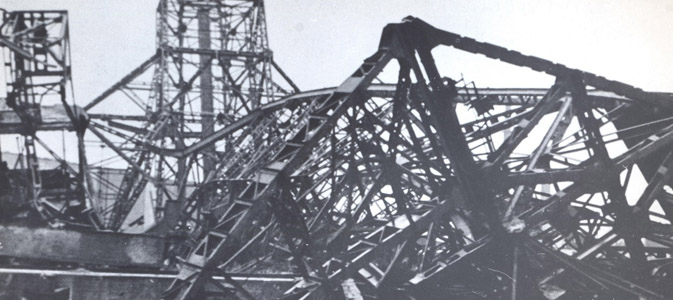The exhibition will be available at 1 Solidarności Square until the end of January 2024. The vernissage will be followed by a debate 'Szczecin - a City that Is Not in the Region, that Cannot Be Seen' at the conference room/space of dialogue.
Katarzyna Górewicz, Rafał Jesswein and Tomasz Wieczorek have accepted the invitation to participate in the debate (held in Polish). We would like to invite you on Tuesday, 21 November 2023, at 5 P.M., to the opening of the open-air exhibition entitled. "Tower of Babel. West Pomerania after 1945".
The exhibition is intended as an invitation to reflect on whether West Pomerania, a territory with a very complicated history, has succeeded over several decades in creating a community with strong ties to its small homeland, which for the majority only became so after the Second World War. The Western and Northern Territories, including West Pomerania, the places where the Allies decided their future, were affected by all the most difficult phenomena of the war and post-war times: Nazism, displacement, destruction of the achievements of generations, slave labour of forced labourers, concentration camps, death, violence, rape, looting, escapes, change of borders, total exchange of population, then Stalinism, persecution of opponents of the new system, suppression of anti-communist protests, and finally erasure of inconvenient remembrance and deformation of history. The exhibition will recall the pre-war inhabitants of these lands, tell the story of the Germans displaced or detained after the war against their will, and the history of the indigenous population, including the Kashubians. It will recall those who came to this land of their own free will, tempted by the promises of a better life, stopped over during their return from the West, from concentration camps, oflags, stalags, from the formations of the Polish Armed Forces in the West. It will commemorate the Lager prisoners brought in transports from the Eastern Borderlands, occupied by the USSR, as well as the people resettled under the post-war agreements. It will also be the story of minorities seeking a peaceful place in West Pomerania, in a state that was to become mono-national. Some, in turn, found that it was from West Pomerania that it would be easy to escape to the West. There will also be stories about Ukrainians displaced as part of Operation Vistula from south-eastern Poland under the pretext of fighting the Ukrainian Insurgent Army.
The exhibition clearly shows that it was not only minorities who were treated with distrust by the new communist authorities. In addition to the soldiers of the independence underground, all those with whom pre-war Poland was associated, including the landed gentry and soldiers returning from the West, were considered opponents of the system. In the Western and Northern Territories, which constituted the strongest evidence legitimising the power of the new government, people from various ends of Poland were settled, propagating the myth of the 'return to the Motherland'. For many decades, the German history of these lands was a taboo subject, but it was not the only one kept silent. The right to remember the past was denied to, among others, the Sybiracy, the Katyń Families, the soldiers of the underground movement and the aforementioned landed gentry. For years, attempts were also made to keep silent about the real reasons for and course of the socio-political upheavals when people demanded dignity and, in time, freedom.
Was it possible, in this situation, to create a strong community whose power could strenghten the significance of the region? Certainly, after 1989, it became possible to restore, to discover, to unmake memory, and - also - to face it, which was and is not always an easy process. The exhibition invites us to consider whether this process has been completed and, if not, at what stage it is now. And will it be possible to build the mythical Tower of Babel on this land, so burdened by a difficult memory, the gaps of which are still being filled?
Katarzyna Górewicz studied Germanic philology, then children's book illustration at the Hamburg University of Applied Sciences. She spent ten years in Germany. After returning to Szczecin, she started working as an illustrator at the Triglav publishing house. Her passion is Slavic culture, which has inspired numerous artworks, including the motanki for which Górewicz is famous. The themes that have become the source of much of her work are usually female energy and the motif of death. In 2023, she took up a degree in art therapy thinking about using folk culture in therapy.
Rafał Jesswein, journalist, publicist for local ("Morze i Ziemia", Szczecin supplement of "Gazeta Wyborcza") and national ("Rzeczpospolita", "Puls Biznesu", "ITD", "Prawo i Życie") press. Two-time winner of third prize in the "Odra" monthly reporter's competition, nominated for the Tadeusz Mazowiecki Polish-German Journalist Award. Former press officer of two mayors of Szczecin, co-founder of the Association of Friends of Western Pomerania "Klub Szczeciński" in Warsaw, where he spent twenty years. On his return he wrote "Enklawa", a book about the first post-war years of Szczecin.
Tomasz Wieczorek, licensed tour guide and tourist pilot, employee of the Pomeranian Dukes' Castle in Szczecin. Originator of the project, which included the publication "Śladami Lubinusa. Przewodnik niezwykły", as well as the film "Zamek wśród atrakcji Pomeranii" and games devoted to the Griffin dynasty. Co-author of the guide "Szlak Gryfitów", recognised as the best guide in Poland in 2021. Author of the concept of the children's guide "Zwiedzamy Zamek" and other guides to Szczecin. Lecturer and examiner of courses for guides in Szczecin and the region.
Exhibition
Tower of Babel. West Pomerania after 1945.
21.11.2023 – 31.01.2024
The National Museum in Szczecin – the Dialogue Centre Upheavals
pl. Solidarności 1, 70-549 Szczecin
Curator
Agnieszka Kuchcińska-Kurcz
Content & selection of photographs
Agnieszka Kuchcińska-Kurcz
Historical review
prof. Jan Skórzyński
Curatorial cooperation
Kamila Krężel
Paula Sendra
Projekt graficzny
Agnieszka Grądek
Proofreading
Wiktoria Klera-Olszak
Organizer
The National Museum in Szczecin
The Network of Wetern and Eastern Territories
